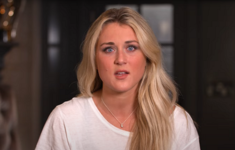Transgender powerlifter JayCee Cooper has won her discrimination lawsuit against USA Powerlifting (USAPL), a competitive federation that had banned her and other trans people from competing.
Cooper sued USAPL in January 2021, saying that its policy violates Minnesota’s Human Rights Act, a law that explicitly forbids transgender-based discrimination.
Related:
Anti-trans protestors promise to sue the NCAA for giving students opportunities
One protestor is super angry that she tied with a trans athlete – but they were both beaten by four cisgender women.
In his decision, District Court Judge Patrick Diamond ordered USAPL to immediately stop discriminating based on gender identity and to submit revised participation policies within two weeks.
On January 30, 2019, USAPL sent Cooper, a USAPL member, a letter forbidding her from competing. The federation’s policy said that “transgender women are allowed to compete in the division reflecting their birth,” meaning that trans women must compete against other lifters who were assigned a male gender at birth.
Never Miss a Beat
Subscribe to our newsletter to stay ahead of the latest LGBTQ+ political news and insights.
The USAPL policy also stated that trans men couldn’t compete against other men if the trans men were taking testosterone, a hormone typically taken by trans men as part of their medically-approved health care routine.
The USAPL said its policy wasn’t a ban on transgender athletes but rather meant to regulate drug testing and ensure fairness in the competition since female trans people have a “direct competitive advantage” over cisgender women due to bodily differences such as “increased body and muscle mass, bone density, bone structure, and connective tissue.”
In his decision, Diamond wrote that “[USAPL] separated Cooper and segregated her and, in doing so, failed to fully perform the contractual obligations it agreed to when it accepted Cooper’s money and issued Cooper a membership card.”
The judge gave USAPL two weeks to submit a revised policy to remedy “three specific areas of discrimination,” Outsports reported. There will also be a May 1 court hearing to decide on possible financial damages that USAPL owes to Cooper for denying her entry into powerlifting competitions.
Medical research hasn’t conclusively proved whether or not trans women have a competitive advantage over cis women. At the time Cooper filed her lawsuit, USAPL’s policies differed from International Powerlifting Federation and the International Olympic Committee, which allowed transgender athletes to compete.
Nevertheless, USAPL maintained its policy and, in February 2019, USAPL banned demonstrations in support of trans-lifters at its events.
In a statement about the court ruling, Cooper wrote, “Trans athletes across the country deserve the same rights and protections as everyone else, and we deserve equitable opportunities to compete in the sports we love.”
“I am thrilled that this ruling recognizes our rights and our humanity and hopefully opens doors for transgender athletes everywhere to participate fully in sports,” she added.
Don't forget to share:













